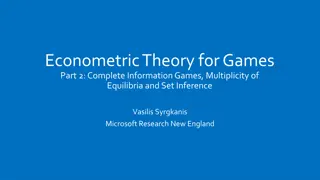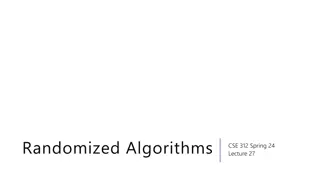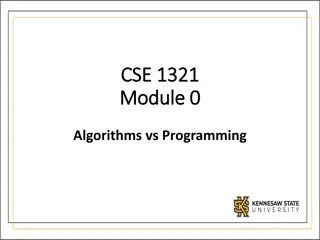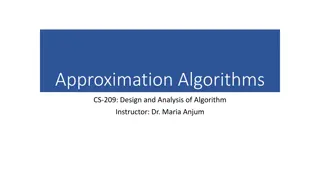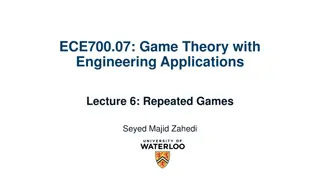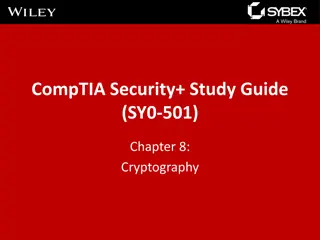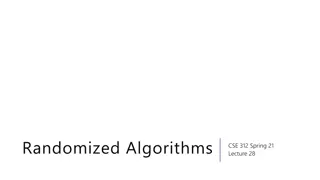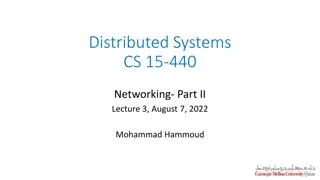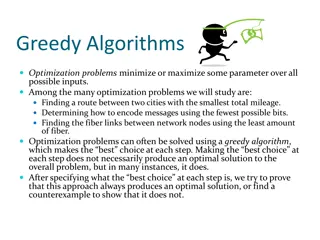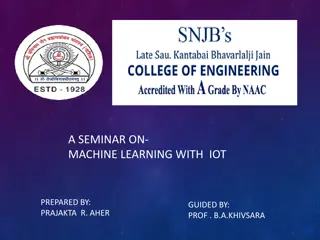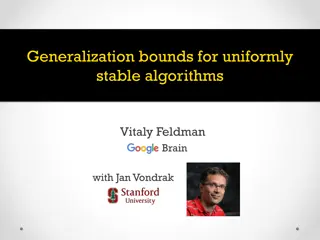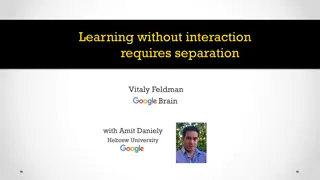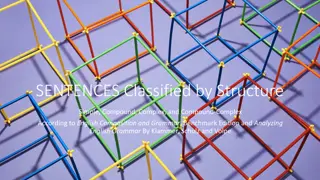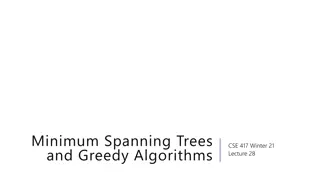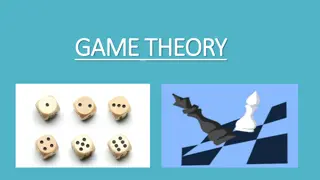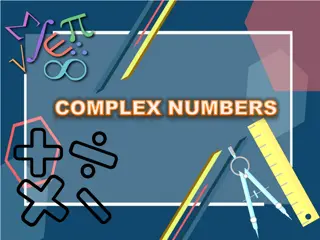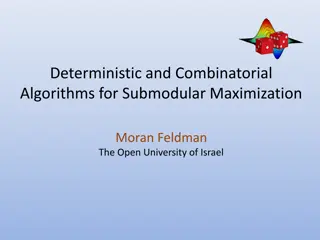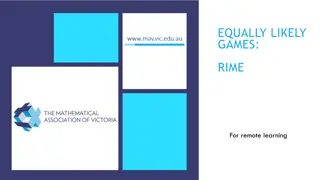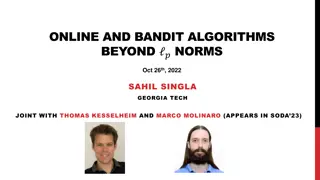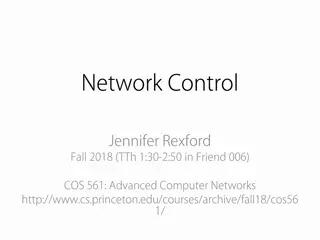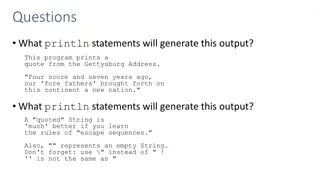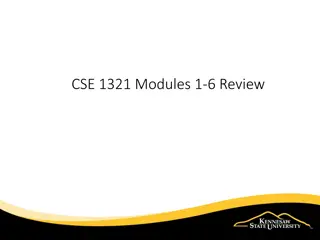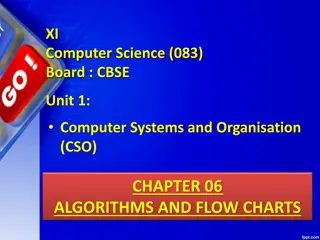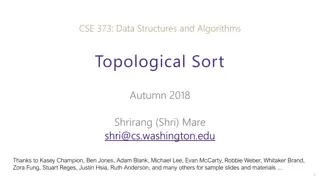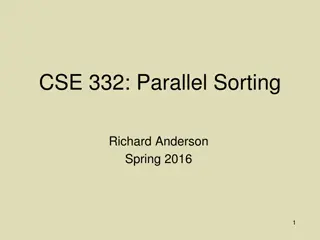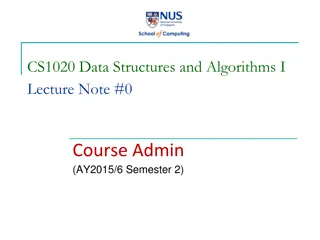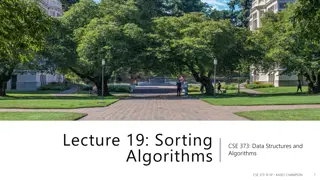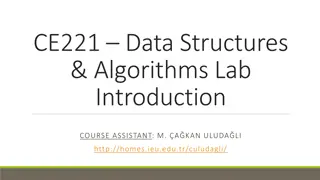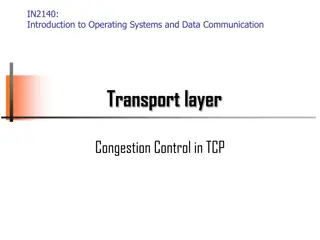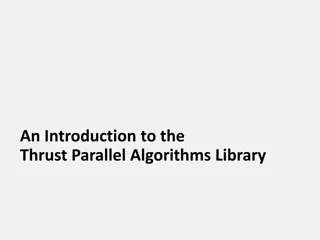Learning Algorithms in Simple and Complex Games
This paper by Viliam Lisý from the Artificial Intelligence Center at Czech Technical University in Prague discusses algorithms for learning in both simple and complex games. It explores the different strategies and techniques used in artificial intelligence to improve players' performance and decision-making abilities in gaming environments, shedding light on advancements in the field of game AI research.
Uploaded on Sep 14, 2024 | 0 Views
Download Presentation

Please find below an Image/Link to download the presentation.
The content on the website is provided AS IS for your information and personal use only. It may not be sold, licensed, or shared on other websites without obtaining consent from the author. Download presentation by click this link. If you encounter any issues during the download, it is possible that the publisher has removed the file from their server.
E N D
Presentation Transcript
Algorithms for learning in simple and complex games Viliam Lis Artificial Intelligence Center Department of Computer Science, Faculty of Electrical Engineering Czech Technical University in Prague (Sep 24, 2018)
Algorithms for learning in simple and complex games Brief Introduction to Game Theory Viliam Lis Artificial Intelligence Center Department of Computer Science, Faculty of Electrical Engineering Czech Technical University in Prague (Sep 24, 2018)
Game Theory Mathematical framework studying strategies of players in situations where the outcomes of their actions critically depend on the actions performed by the other players. 3
Computational Game Theory Analytic approach Small model size Inputs in analytic form Analysis of system behavior Complete understanding Computational approach Huge model size Real world data as inputs Computing optimal strategies Partial understanding
Matrix (normal form) games Player 2 Column player Minimizer r p s R 0 -1 1 Player 1 Row player Maximizer P 1 0 -1 S -1 1 0 Zero-sum game, pure strategy, mixed strategy Best response ???? ? = arg max ?? ??????,? ? Nash equilibrium, game value 5
Non-zero Sum Games b f B 2, 1 0, 0 F 0, 0 1, 2 What is the Nash equilibrium? c d Equilibrium selection problem C -1, -1 -7, 0 Correlated equilibria, coarse correlated Stackelberg equilibrium D 0, -7 -5, -5 6
Plan Online learning and prediction single agent learns to select the best action Learning in normal form games the same algorithms used by multiple agents Learning in extensive form games generalizing these ideas to sequential games Brief introduction to neural networks DeepStack 9
Algorithms for learning in simple and complex games Introduction to Online Learning and Prediction Viliam Lis Artificial Intelligence Center Department of Computer Science, Faculty of Electrical Engineering Czech Technical University in Prague (Sep 24, 2018)
Introduction Online learning and prediction learning from data that become available in sequence adapting prediction (behavior) after each data point optimizing overall precision (not only after all data arrive) Applications investing in best fond web advertisements selecting the best (e.g., page replacement) algorithm 11
Introduction Why do we care about online learning in games? repeated play against an unknown opponent (repeated) play of an unknown game understanding how equilibria may occur in real world computationally efficient equilibrum approximation algorithms 12
Prediction with expert advice ?0 0.2 0.5 0.3 ?0= 0.55 ?0 0 0.5 1 ?1 0.1 0.4 0.5 ?1= 0.3 ?1 1 0.5 0 ?2 0.3 0.3 0.4 ?2= 0.3 ?2 0 1 0 ?? ?? ?1 ?2 ?3 ?? ?? ?? Problem definition Set of ? actions (experts) ? = {?1,?2, ,??} Set of time steps ? = 1,2, ,? In each step Decision-maker selects a mixed strategy ?? An adversary selects rewards ??:? [0,1] (adaptive vs oblivious) Action at ? is selected based on ?? The decision-maker receives reward ??(??) (learns the whole ??) 13
External Regret ?0 0.2 0.5 0.3 ?0= 0.55 ?0 0 0.5 1 ?1 0.1 0.4 0.5 ?1= 0.3 ?1 1 0.5 0 ?2 0.3 0.3 0.4 ?2= 0.3 ?2 0 1 0 ?? ?? ?1 ?2 ?3 ?? ?? ?? Goal: play as well as the best expert Immediate regret at time ? for not choosing action ? ??? = ??? ?? Cumulative external regret for playing ?0,?1 ?? ??= ???? ? ?=0 ??(?) = ???? ? ?=0 Average external regret for playing ?0,?1 ?? ??= ? ? ? ??(?) ?=0 ?? 1 ??? 14
Swap Regret ?0 0.2 0.5 0.3 ?0= 0.55 ?0 0 0.5 1 ?1 0.1 0.4 0.5 ?1= 0.3 ?1 1 0.5 0 ?2 0.3 0.3 0.4 ?2= 0.3 ?2 0 1 0 ?? ?? ?1 ?2 ?3 ?? ?? ?? Goal: minimize regret for not playing a ? ? instead of ? for some ?:? ? Cumulative swap regret for playing ?0,?1 ?? ??= ???? ?=0 ? ???? (???(?) ??(?)) ? Internal regret allows switching only all occurrences of ??by ?? External Swap, Internal Swap 15
No-regret algorithms An algorithm has no regret if for any ?0,?1 ??produces ?0,?1 ?? such that ?? 0 as ? . 16
Why not simply to maximize reward? ? ?? ???????? ?=0 The adversary may choose ? ? , ??? = 0 and we have minimal reward regardless of the used algorithm. Any algorithm has (optimal) 0 regret. 17
Regret towards best strategy in hindsight ? ? ??????= ???? ? ??(?) ?? ?=0 ?=0 Proposition: There is no algorithm with no regret towards the best sequence of choices. Proof: Let ? = {?,?}. For an arbitrary sequence of strategies ??, choose a reward vector ??= 0,1 if ??? 1 otherwise. 2 and ??= 1,0 ?? ? The cumulative reward of the algorithm ?=0 strategy in hindsight has reward ?=0 ?????? ? 2, while the best ? ???? ? ??(?) = ?. Therefore ? 1 2 ? ? 2 and ????? 18
Regret of deterministic algorithms Proposition: There is no deterministic no-external-regret algorithm. Proof: We assume that the adversary selects rewards ?? knowing strategy ??. (For example, it can simulate the deterministic algorithm from the beginning.) Therefore, with ? = 2, he can always give reward 0 for the selected action and 1 for the other action. One of the actions got reward 1 at least ?/2 times, therefore ?? 1 2. 19
Lower bound on external regret Theorem:No (randomized) algorithm over ? actions has expected external regret vanishing faster than ( ln(?)/?). Proof sketch: Assume n=2. Consider an adversary that, independently on each step t, chooses uniformly at random between the cost vectors (1, 0) and (0, 1) regardless of the decision-making algorithm. The cumulative expected reward is exactly ?/2. In hindsight, however, with constant probability one of the two fixed actions has cumulative reward T/2 + ( ?). The reason is that T fair coin flips have standard deviation ( ?). 20
Lower bound on external regret Theorem: There exist no-regret algorithms with expected external regret ?( ln ? /?). Proof: We will show Randomized Weighted Majority algorithm. Corollary: There exists a decision-making algorithm that, for every ? > 0, has expected regret less than ? after ?(ln ? /?2) iterations. 21
Randomized Weighted Majority Aka Hedge or multiplicative weights (MW) algorithm. It is easier to analyze in costs ? ? = (1 ? ? ). The algorithm maintains weights ?(?) for each action ? ?. Initialize ?1? = 1 for every ? ? For each time ? = 1,2, ,? Let ??= ? ???(?) and play ??(?) = ??(?)/?? Given costs ??, set ??+1? = ??? 1 ???(?) for each ? ? (Equivalently ??+1? = ??? ? ???(?) for ? = ln(1 ?) ) 22
Hedge Regret Bound Theorem: Expected external regret of Hedge is ??< 2 ??(?)/? Proof: W.L.O.G. we assume oblivious adversary. Let ??? = min ? ? ?=1 ??= ? ???? ??? = ? ? ??(?) be the cost for optimal action ? and ? ??? ?? ??? be the algorithms cost at ?. 1 ???? = 1 ???? ?? ??? = ?1? ?=1 ??+1= ? ???+1? = ? ???? 1 ???(?) ? ? ???? 1 ???? = ??(1 ???) ? 1 ???? ?? ?1 ?=1 1 ??? ???ln 1 ? ln? + ?=1 ? ? ln(1 ???) ? => 1 ??? ??? + ?? +ln ? ??? ??? ln ? ? T ? ?+ 2 23
Regret Matching The algorithm maintains cummulative regrets R(?) for each action ? ?. Initialize ?1? = 0 for every ? ? For each time ? = 1,2, ,? Let S?= ? ?max(0,??(?)) and play ??(?) = max(0,??(?))/S? Given rewards ??, for each ? ? set ??+1? = ??? + ??(?) = ??? + (??? ??? ??(?)) ? ? 24
Regret Matching+ The algorithm maintains cumulative regrets-like values Q(?) for each action ? ?. Initialize ?1? = 0 for every ? ? For each time ? = 1,2, ,? Play ??(?) = ??(?)/ ? ???(?) Given rewards ??, for each ? ? set ??+1? = max(0,??? + ??? ) = max(0, ??? ??? ??(?)) ? ? 25
RM+ Regret Bound Lemma: Regret-like values ??? are an upper bound on ??? . Proof: ??+1? ??? = max 0,??? + ??? ??? + ??? ??? = ??(?) ??? Lemma: For any ? and value functions ??? 2 = max ??. Proof: max ? A ??? ? A ???2 ? ????2= = ? ?max(0,?? 1? + ??(?) ? ???? ??? )2 ??? 1?2+ ? By induction ???2 ??. 26
Summary General setting of prediction with expert advice Regret as a measure of distance from the optimal strategy There are no-regret algorithms Hedge, Regret matching, Regret matching+ 27
Plan Online learning and prediction single agent learns to select the best action Learning in normal form games the same algorithms used by multiple agents Learning in extensive form games generalizing these ideas to sequential games Brief introduction to neural networks DeepStack 28
Algorithms for learning in simple and complex games Learning in Normal Form Games Viliam Lis Artificial Intelligence Center Department of Computer Science, Faculty of Electrical Engineering Czech Technical University in Prague (Sep 24, 2018)
Introduction How may simple learning agents achieve equilibrium outcomes? Best Response Dynamics (Fictitious play) best response to average empirical play needs to know the game No-Regret Dynamics each player uses no-regret algorithm may now only their own actions and received rewards 30
Best response dynamics Fictitious play Players maintain empirical distribution of past opponent s actions ? ? ?=1 ?) (often in form of frequencies ?? ? ? T ?=1 ? ? In each round, each player plays BR to these distributions ?= arg max ?) ?? ?? ????(??, ? ? 31
Result of FP in case of convergence Theorem: If the empirical action frequencies of fictitious play converge ( ?? ? ) they converge to the Nash equilibrium of the game. Theorem: The empirical frequencies of FP converge to NE in constant-sum games two player games where each player has up to two actions games solvable by iterated strict dominance identical interest games potential games 32
Why it may not converge? Shapley s example in a modified rock-paper-scissors: R S P R 0, 0 1, 0 0, 1 S 0, 1 0, 0 1, 0 P 1, 0 0, 1 0, 0 Unique NE is the uniform strategy for both players. Let ?1 0= (1,0,0) and ?2 0= 0,1,0 . Play may be (P,R),(P,R) for ? steps until column switches to S. Then (P,S) follows until row switches to R (for ?? steps, ? > 1). Then (R,S) follows until column switches to P (for ?2? steps). The play cycles among all 6 non-diagonal profiles with periods of ever- increasing length, hence, the empirical frequencies cannot converge. 33
Convergence of FP Theorem (Brandt, Fischer, Harrenstein, 2010): In symmetric two-player constant-sum games, FP may require exponentially many rounds (in the size of the representation of the game) before an equilibrium action is eventually played. This holds even for games solvable via iterated strict dominance. a b c Proof: a 0 -1 -? b 1 0 -? c 0 ? ? With ? = 2 ?, FP may take 2? rounds to play the equilibrium action ? for the first time. (a,a),(b,b), ,(b,b) 2? 1 times 34
No-Regret Learning Summary Immediate regret at time ? for not choosing action ? ??? = ??? ?? ?? Cumulative external regret for playing ?0,?1 ?? ? ? ? ??= ???? ? ?=0 ??(?) = ???? ? ?=0 ??(?) ?=0 ?? ?? Average external regret for playing ?0,?1 ?? ??= 1 ??? An algorithm has no regret if for any ?0,?1 ??produces ?0,?1 ?? such that ?? 0 as ? . 35
From External to Swap Regret Cumulative swap regret for playing ?0,?1 ?? ? ??= ????:? ? ?=0 ? ???? (???(?) ??(?)) 36
From External to Swap Regret Theorem (Blum & Mansour 2007):If there is a no-external-regret algorithm for a setting, there is also a no-swap-regret algorithm. Proof: Polynomial black-box reduction. ?? ?? ?? ?? 37
From External to Swap Regret Proof: Average expected reward of the overall algorithm ? ? 1 ? ?=1 ??? ??(?) ?=1 1, ,?? ?, gets ?1? ?1, ,??? ??. No-regret algorithm ?? choses ?? Thus ? ? ? ? ?:1 ?? (??? ??? ) 1 ??? ??? ?j ?? ? ?=1 ? ?=1 ?=1 Fix an arbitrary ?:? ? and sum over all ? ?: ? ? ? ?? ??? ??? ? ? ? 1 ? ?=1 1 ??? ??? ? ?? ?? ? ?=1 ?=1 ?=1 ?=1 ?=1 38
From External to Swap Regret We are done if we ensure ? ?? ??(?) ??? = ?? ?=1 ? for ? = 1. This is true if ?? is the eigenvector of matrix given by ?? Equivalently, ?? are the stationary distribution of Markov chain. Such vector ?? always exists and can be easily found! 39
From External to Swap Regret Corollary: Let ??? 0 be the external regret convergence bound for a base algorithm used in the black-box reduction with ? actions. Than the swap regret of the overall algorithm is ???? ? ??? . Corollary: The black-box reduction with Hedge for all actions produces an algorithm with ???? 2 ? ln|?|/?. 40
No-Regret Dynamics full information Definition: ? using 1) Each player ? choses independently a mixed strategy ?? a no-regret algorithm. 2) Each player receives for all ?? ?? rewards ?? ??? = ?? ?~? ?[? ??,? ?] 41
No-Regret Dynamics full information Theorem: If after T iterations of no-regret dynamics each player has external regret lower then ? than ? =1 ?=1 ?? for any ?? ??~???? ??~????? ???, where ??= ? ? ? ?, is an ?-coarse correlated equilibrium of the game. I.e., ?? ,? ? ? Corollary: If we run Hedge in a game with less than |?| actions for each player for ?iterations, the resulting average strategy is an ( ??(|?|)/?)-coarse correlated equilibrium of the game. Corollary: If we run regret matching+ in a game with less than |?| actions for each player for ?iterations, the resulting average strategy is an ( |?|/?)-coarse correlated equilibrium of the game. 42
Minimax Theorem Note: In zero-sum games, coarse correlated equilibria are Nash. Theorem (Minimax Theorem): For any matrix game ? ???? = min ???? max ? min ? max ? ? Proof: For contradiction assume that for some ? > 0 ???? < min ???? ? . max ? min ? max ? ? Set ? =? Let ?, ? be the empirical frequencies of their play and ? the average reward of the maximizer. max ? ? ? 2 and let both players run Hedge for time ? = 2ln?/?2. ???? min ???? ? ? max ??? ? 2? min ???? ? min max ? ? ? 43
No-Regret Dynamics Theorem: If after T iterations of no-regret dynamics each player has swap regret lower then ? than ? =1 ?=1 ?? player ? and switching function ?:? ? ??~???? ??~????(??),? ? ???, where ??= ? ? ? ?, is an ?-correlated equilibrium of the game. I.e., for any ? 44
Regret matching+ ?2 Iteration: 0 R2 r2 ?? 0 0 R1 0 r1 ?1 0.5 0.5 2 0 0.5 0 0 1 0.5 45
Regret matching+ ?2 Iteration: 1 R2 r2 ?? 0 0 R1 0 r1 ?1 0.5 0.5 2 0 0.25 0.5 0 0 1 -0.25 0.5 46
Regret matching+ ?2 Iteration: 1 R2 r2 ?? 0 0 R1 0.25 r1 ?1 0.5 0.5 2 0 0.25 0.5 0 0 1 -0.25 0.5 47
Regret matching+ ?2 Iteration: 1 R2 r2 ?? 0 0 R1 0.25 r1 ?1 0.5 0.5 1 2 0 0.25 1 0 0 0 1 -0.25 0 48
Regret matching+ ?2 Iteration: 1 R2 r2 ?? 0 0 -1 1 R1 0.25 r1 ?1 0.5 0.5 1 2 0 1 0 0 0 1 0 49
Regret matching+ 0 1 ?2 Iteration: 1 R2 r2 ?? 0 1 -1 1 R1 0.25 r1 ?1 0 1 1 2 0 1 0 0 0 1 0 50


